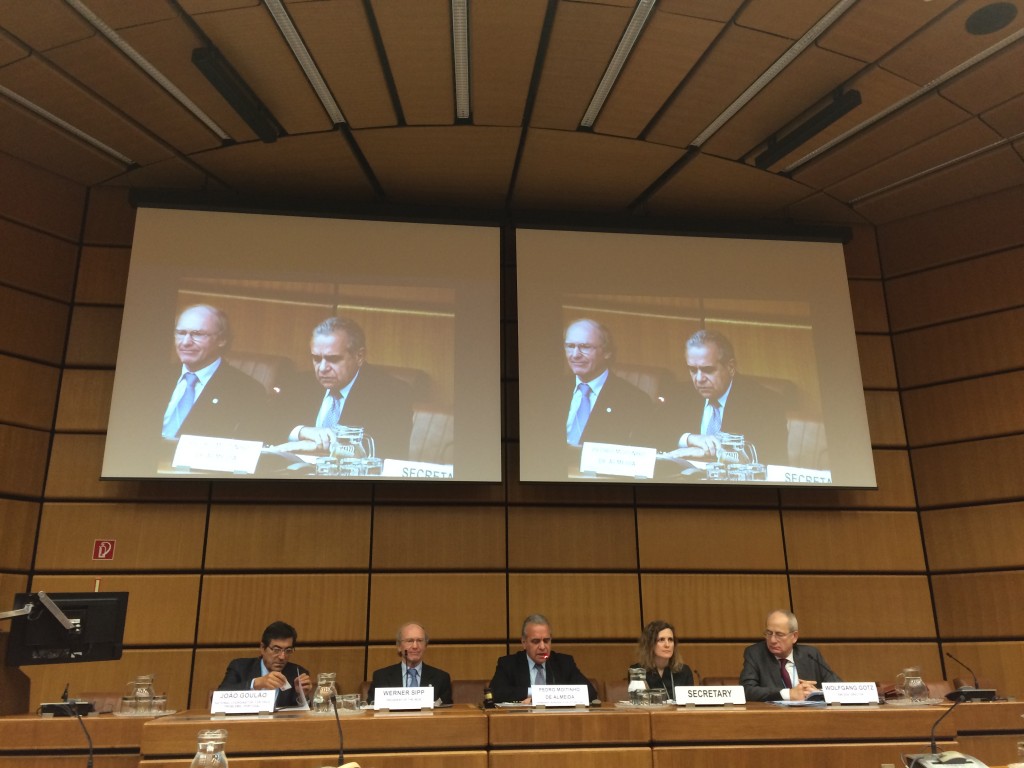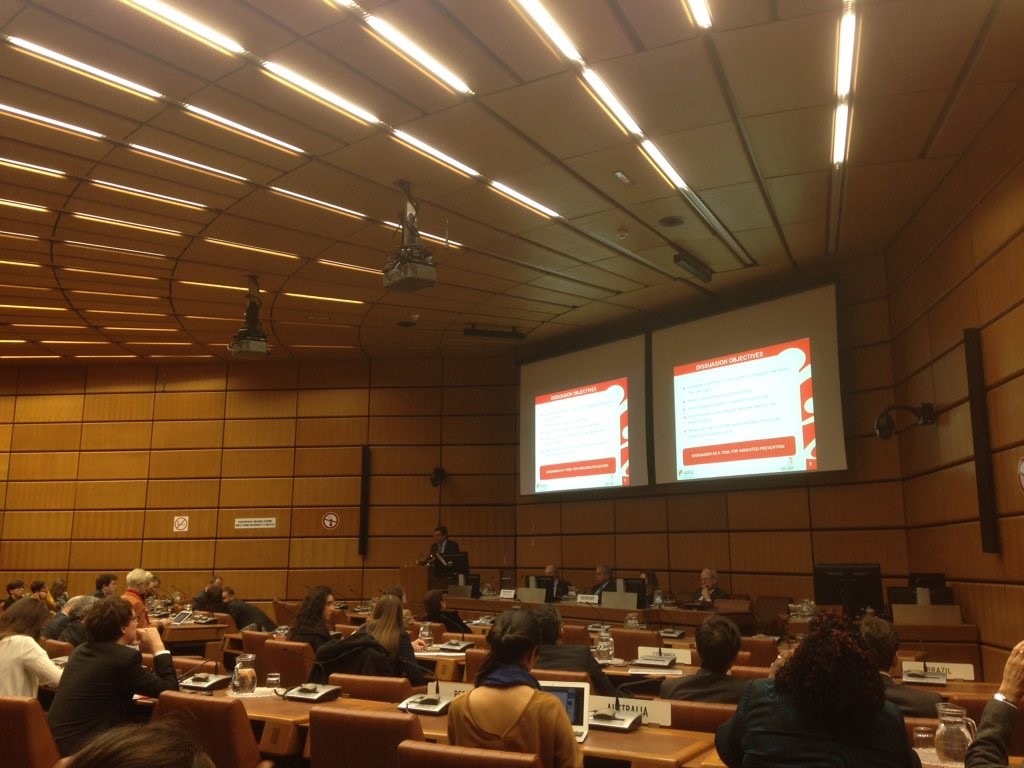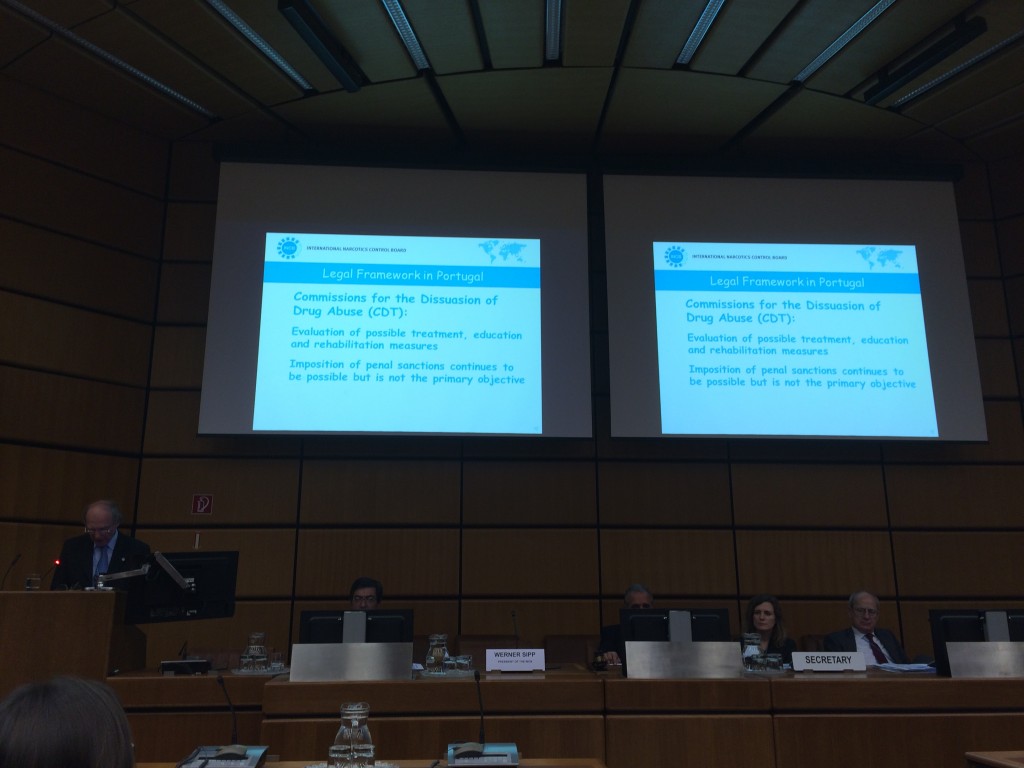Side event organised by Portugal
Pedro Moitinho de Almeida Permanent Representative of Portugal. The Portuguese case no longer an experience, a success. Portugal is fully committed to the UNGASS. Drugs ranked at top of concern of Portuguese society in the last decade. It is now no longer the case because of the policies now implemented. The government had the courage to adopt a policy that shifted from law enforcement to healthcare, within the framework of the 3 UN drug conventions.
Wolfgang Gotz, EMCDDA, Director. The EU is moving to increased emphasis on public health when dealing with drug approach. There is the criminal justice approach and the public health approach. Changes that have taken place in EU countries illustrate the two. The criminal justice approach was institutionalised in 1988 convention, which clearly requests states parties to establish possession for personal use as a criminal offence, believing that this would reduce supply. Since then we have seen a contraction in the criminal justice approach as European countries reviewed their laws related to drug abuse, reducing maximum prison sentences. Finland, Greece and the Czech republic made changes to close a minor case. Austria and Poland moved to depenalisation. Changes were made to modify the status of drug use from criminal to non- criminal offences, this was the case in Portugal (others) and most recently Malta.
There is a denial of legalisation in Europe, or any removal of sanctions to allow for non-medical use. Options to alternatives to punishment include treatment, rehabilitation, and aftercare. Alternatives to prison in Europe implied an emphasis on public health but it was not clearly stated. From 2000 on, Europe saw the development of diversion towards treatment at different stages of the criminal justice system: using the police, prosecution, and at court level. Prosecution may be suspended upon completion of treatment — this is the case in 11 European countries. In 10 countries, the system may convict users, and then suspend sentence. In five countries, rehabilitation can be the sentence. Most are arrested for property crimes to get money to purchase drugs. Even those arrested for theft or similar offences may still be diverted to treatment if appropriate. Do these approaches work?
In the redesign of these approaches, it is important to be consistent and realistic. Policymakers are caught between a public health approach and the need to be “tough” on drugs. Diversion may only be possible for those with no criminal conviction. If treatment is only offered after penalty carried out, users have no incentive to enter the programme. If diversion only takes place at sentencing stage, you lose valuable time to process offenders. It should be upstream to reduce court backlogs. One size does not fit all. The offender should be matched to his/her specific needs. Quality standards for demand reduction have been newly adopted.
Non-problematic cannabis users should not be sent to heroin treatment, it is counterproductive. European monitoring centers must produce evidence. We still don’t have high quality scientific evidence on different options around Europe. In many countries there is no Monitoring & Evaluation of effectiveness. And it is only due to evaluation that some problems came to light and that a system can be improved. A public health approach is more effective than criminal justice in reducing recidivism, and we are heartened to see that work preceding UNGASS working in this direction.
We need to strengthen monitoring and evaluation worldwide and regionally in order to constantly improve our approach. Monitoring activity confirms that many European countries are trying to rebalance their drug policies towards a public health approach.
Joao Goulao. National Coordinator for Drug Problems, Portugal. We have adopted a comprehensive set of policies, decriminalisation is just a part of it. Available indicators and results are positive around the implementation of this complete set of policies. The idea is to be more coherent in addressing the drug problem as a health and social issue rather than a criminal one. This approach started much later than the criminal one. During the authoritarian regime we had no problems with drugs. Suddenly we saw the onset of problems after dictatorship, even if the prevalence of total drug use remained below the European average, we had one of the biggest amounts of problematic users. We had to find new ways to address these issues. Historically, there have been 2 different contradictory approaches. One was to consider drug use as a crime — the other considers addiction as a chronic health and behavioral issue that needs to be addressed through treatment and support.
Joao Goulao, presenting the case of Portugal
We addressed the issue in the context of the community. Drug addicts needed access to care, housing, etc. All sectors of society got involved. Our policy was based on five pillars including treatment, dissuasion, reintegration, harm reduction, etc. This new paradigm was approved by the parliament, and a new legal framework, Law 30/2000, was adopted. At the time, there was good social acceptance, and a huge public debate on the issue. We also needed to liberate resources from supply reduction to fight against large scale trafficking. We recognised that the imprisonment of users has a counterproductive effect. The new law entered into force on July 1, 2001.
The World Drug Report 2009 was no longer critical (as was the case at the beginning). The INCB itself says that decriminalisation falls within the spirit of the conventions. In our case, sanctions fall under administrative law, not criminal law, and drug possession is still prohibited.
We have adopted a dissuasion model, where possession is an administrative offence. The approach does not privilege a drug courts approach. The law allows a dose for up to a maximum of ten days as personal possession. The established limit was very important to avoid an arbitrary police intervention. This is based on a preventive intervention — the “yellow card”. The objective is to prevents or reduce use and abuse of drugs. It ensures health protection for users and and the community.
Composition of the Commissions — there are 18 commissions + 2 in the autonomous regions. They are composed of a lawyer, a psychologist, a social worker, and a technical support team. The approach must include a complete network to address the myriad of identified needs of people. We try to evaluate and intervene upstream to interrupt or prevent problematic use. The Commissions take the decision and can impose sanctions including: provisional process suspension, periodic presentation to drug addiction dissuasion commissions, etc.
Some results: this is a complete set of policy, not only decriminalisation. There is no direct causal link between decriminalisation and the results. In 2014, we had 8, 800 clients, only 801 addicts. 742 were treated. Out of the others, 1,161 were referred to motivational intervention only, and 2,747 were referred to motivational intervention and support structures. There was a very impressive drop in new HIV infections among people who inject drugs. Trends since 2001: a small decrease in reported illicit drug use among adults, reduction in opiate related deaths and infectious diseases, increased efficiency of police and customs, increased amounts seized, reductions in retail prices, reduced stigmatisation of drug users.
There is now a scientific consensus that criminal sanctions are ineffective and counterproductive. They do nothing to address drug use consequences. Nowhere do the international drug conventions require that personal use be criminalised. Drug policies should be based on health, not on punishment.
Werner Sipp. INCB President. On behalf of INCB, we thank the organisers. Joao showed the Portuguese case to me many years ago. He explained its framework. The decriminalisation approach in Portugal is innovative but not unique. Many other countries have decriminalised, in Europe as well as in Latin America. The development of alternative measures for small amounts of drugs has been favoured by most European systems. What is unique in Portugal is the dissuasion commissions which provide support for users. Others limit themselves to reducing or eliminating punishment. The Portuguese model is not a window to legalisation. The INCB pronounced itself on the Portuguese approach on several occasions. In 2004, the INCB visited Portugal and considered the implementation of the law. In June 2012, the INCB visited Portugal again and acknowledged importance of the dissuasion commissions. Primary prevention was strengthened, and Portugal continued its committment to the drug conventions, the Board concluded.
Legal Perspective: the basic obligation under the treaties is to limit the possession of drugs exclusively to medical and scientific purposes. Possession shall not be permitted except under legal authority. Limitations to the obligation to establishment of “punishable offence” include constitutional limitations of states parties. For possession for personal consumption, states can provide alternatives to conviction or punishment, something that all the conventions allow. Within the legal framework of Portugal, acquisition and possession are still deemed an offence and are sanctioned by administrative rather than criminal sanctions. Within Article 4 of SC, ten days’ use are allowed. The whole procedure can be considered as an alternative measure of education, treatment, aftercare, etc. in full compliance with the three drug conventions.
It is difficult to evaluate success. The introduction of health and social policy reforms is absolutely key and is based on the principle of proportionality and respect for human rights. Portugal may be a useful best practice model for other countries considering transition in lead up to UNGASS. Dependence manifests itself in different ways in different countries. It depends on the legal system, policy priorities, cultural factors, etc. One model cannot simply be transposed to another, but this can serve as best practice.


